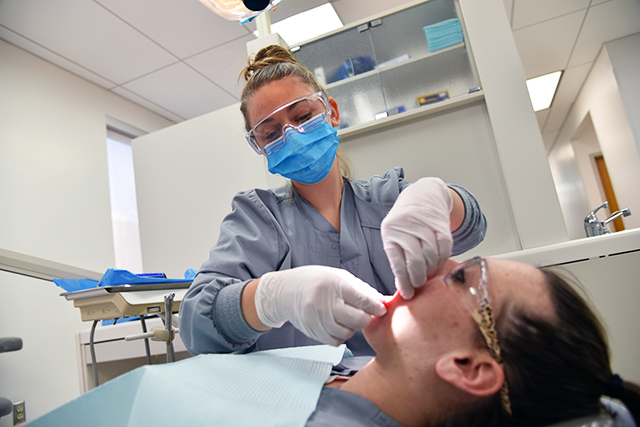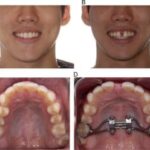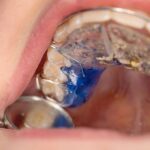What does an EFDA do?
An EFDA is a dental assistant who has received additional training and certification to perform a wide range of advanced dental procedures. As an EFDA, you will work closely with dentists to provide chairside assistance during dental procedures, including restorative and cosmetic treatments. You will also be responsible for taking and developing dental X-rays, preparing patients for treatment, and educating them on oral hygiene practices.
What qualifications do you need?
To become an EFDA, you will need to complete a dental assisting program accredited by the Commission on Dental Accreditation (CODA). These programs typically take between 9 to 12 months to complete and include both classroom instruction and hands-on clinical experience. Upon graduation, you will need to pass a state-specific exam to become a certified dental assistant (CDA). Once you have obtained your CDA, you can then enroll in an EFDA program to receive additional training in expanded functions.
Skills and qualities of a successful EFDA
Besides the necessary qualifications, there are several skills and qualities that will help you excel as an EFDA. Strong communication skills are essential, as you will be interacting with both patients and dental professionals on a daily basis. Attention to detail and manual dexterity are also crucial, as you will be working with delicate dental instruments and performing intricate procedures. Additionally, a compassionate and empathetic nature will allow you to provide the best possible care to patients who may be anxious or in pain.
If you are passionate about oral health and enjoy working in a fast-paced environment, a career as an EFDA may be the perfect fit for you. Follow this guide to start your journey towards becoming an EFDA and embark on a fulfilling and rewarding career in the dental field.
What is an Expanded Functions Dental Assistant?
An expanded functions dental assistant (EFDA) is a dental professional who has received additional education and training to perform a variety of tasks and procedures in a dental office. EFDA’s work under the supervision of dentists and dental hygienists to provide quality dental care to patients.
Education and Training Requirements:
To become an EFDA, individuals must first complete a dental assisting program and obtain certification as a dental assistant. After gaining experience in the field, they can then pursue additional education and training to become an expanded functions dental assistant.
This additional training typically includes coursework in areas such as dental materials and equipment, radiography techniques, infection control procedures, and oral health education. EFDA’s may also receive training in specific clinical procedures, such as placing dental sealants or performing coronal polishing.
Job Responsibilities:
As an EFDA, individuals have a wide range of job responsibilities. They assist dentists and dental hygienists in providing patient care, perform various clinical duties, and handle administrative tasks.
Clinical Duties:
EFDA’s are trained to perform a variety of clinical procedures, including taking and developing dental x-rays, applying topical anesthetics, placing dental sealants, and performing coronal polishing. They may also assist with restorative procedures, such as placing fillings or crowns.
Administrative Tasks:
In addition to clinical duties, EFDA’s are responsible for handling administrative tasks in the dental office. This may include scheduling appointments, maintaining patient records, and processing insurance claims.
Infection Control Procedures:
EFDA’s are trained in infection control procedures to ensure a safe and sterile environment for patients. This includes proper sterilization of instruments and equipment, as well as following strict protocols for infection prevention.
Radiography Techniques:
EFDA’s are trained in radiography techniques to take and develop dental x-rays. They must follow proper safety procedures to protect themselves and patients from unnecessary radiation exposure.
Dental Materials and Equipment:
EFDA’s are knowledgeable about different dental materials and equipment used in dental procedures. They assist with selecting and preparing materials, as well as ensuring that equipment is properly maintained and functioning.
Oral Health Education:
EFDA’s play a role in educating patients about proper oral hygiene and dental care. They may provide instructions on brushing and flossing techniques, as well as answer questions about dental procedures and treatments.
Working with Dentists and Dental Hygienists:
EFDA’s work closely with dentists and dental hygienists to provide comprehensive dental care to patients. They assist during procedures, communicate patient concerns or issues, and collaborate on treatment plans.
Professional Development Opportunities:
EFDA’s have opportunities for professional development and continuing education. They can pursue advanced certifications or specialize in specific areas of dental assisting, such as orthodontics or oral surgery.
Salary and Job Outlook:
The salary and job outlook for EFDA’s can vary depending on factors such as location, experience, and employer. According to the Bureau of Labor Statistics, the median annual wage for dental assistants was $41,180 in May 2020, with job growth projected at 7% from 2020 to 2030.
State Licensing and Certification Requirements:
Each state has its own licensing and certification requirements for dental assistants and EFDA’s. Individuals must meet these requirements to practice as an EFDA in their state, which may include passing a written and practical exam.
Advantages of Becoming an Expanded Functions Dental Assistant:
Becoming an EFDA offers several advantages, including increased job opportunities, higher earning potential, and the ability to provide a wider range of patient care services. EFDA’s also have the opportunity to work in various dental settings, such as private practices, clinics, or specialty offices.
Challenges and Rewards of the Profession:
While being an EFDA can be rewarding, it also comes with its challenges. EFDA’s work in a fast-paced environment and must be able to multitask and prioritize patient needs. They may also encounter difficult or anxious patients, requiring strong communication and interpersonal skills.
Steps to Becoming an Expanded Functions Dental Assistant:
To become an EFDA, individuals should follow these steps:
- Complete a dental assisting program and obtain certification as a dental assistant.
- Gain experience working as a dental assistant.
- Enroll in an expanded functions dental assistant program and complete the required coursework.
- Pass any necessary state licensing or certification exams.
- Seek employment as an EFDA in a dental office or other healthcare setting.
- Continually pursue professional development opportunities to stay current in the field.
Becoming an expanded functions dental assistant requires dedication, hard work, and a commitment to providing quality dental care. However, it can be a rewarding career choice for individuals interested in the dental field and helping others achieve optimal oral health.
Education and Training Requirements
Becoming an Expanded Functions Dental Assistant (EFDA) requires a combination of education and training. In order to pursue this career path, individuals must first obtain a high school diploma or equivalent. After completing high school, aspiring EFDAs can enroll in a dental assisting program accredited by the Commission on Dental Accreditation (CODA).
Dental Assisting Program
During the dental assisting program, students will learn about various aspects of dental care and acquire the necessary skills to assist dentists in providing quality oral healthcare. The program typically includes both classroom instruction and hands-on training in a dental office or clinic setting.
Coursework in the dental assisting program covers a wide range of topics, including dental anatomy, oral health, dental radiography, dental materials, infection control procedures, and dental office management. Students will also learn about the legal and ethical considerations in dental practice.
Hands-on training allows students to practice their skills under the supervision of experienced dental professionals. This practical experience is crucial for developing proficiency in performing clinical procedures and using dental instruments and equipment.
Certification and Licensure
After completing the dental assisting program, individuals may choose to pursue certification as an Expanded Functions Dental Assistant. This certification is not mandatory in all states, but it can enhance job prospects and demonstrate a higher level of competency.
The Dental Assisting National Board (DANB) offers the Certified Dental Assistant (CDA) certification, which includes the option to earn the Expanded Functions Dental Assistant (EFDA) certification. To become certified, candidates must pass the DANB’s exams, which assess their knowledge and skills in various areas of dental assisting.
In addition to certification, some states require EFDAs to obtain a license to practice. The specific licensing requirements vary by state, but typically involve passing a state-administered exam and meeting certain educational and experience criteria.
Continuing education is also important for EFDAs to stay current with advancements in dental technology and techniques. Many states require EFDAs to complete a certain number of continuing education hours annually to maintain their certification or licensure.
Overall, becoming an Expanded Functions Dental Assistant requires dedication and a commitment to ongoing education and professional development. With the right education and training, EFDAs can play a crucial role in providing high-quality dental care and improving oral health outcomes.
Job Responsibilities
As an Expanded Functions Dental Assistant (EFDA), you will have a wide range of job responsibilities. These responsibilities can be divided into two main categories: clinical duties and administrative tasks.
1. Clinical Duties:
- Assisting the dentist during dental procedures, such as fillings, extractions, and root canals.
- Preparing and sterilizing dental instruments and equipment.
- Taking and developing dental x-rays.
- Applying sealants and fluoride treatments.
- Performing dental impressions and making temporary crowns.
- Assisting with the placement and removal of dental dams.
- Performing oral cancer screenings.
- Providing post-operative instructions to patients.
2. Administrative Tasks:
- Scheduling patient appointments and managing the dental office’s calendar.
- Updating and maintaining patient records.
- Processing dental insurance claims and verifying patient insurance coverage.
- Managing inventory and ordering dental supplies.
- Assisting with billing and financial transactions.
- Answering phone calls and addressing patient inquiries.
- Ensuring a clean and organized dental office environment.
Clinical Duties
As an Expanded Functions Dental Assistant (EFDA), you will have a wide range of clinical duties that are essential for providing quality dental care to patients. These duties involve working directly with dentists and dental hygienists to assist in various dental procedures and treatments.
One of the main clinical duties of an EFDA is to prepare patients for their dental procedures. This includes taking and recording vital signs, reviewing medical histories, and ensuring that patients are comfortable and informed about the procedure they will undergo.
During dental procedures, EFDA’s are responsible for assisting the dentist by passing instruments and materials, suctioning and retracting, and maintaining a clear field of vision. They may also assist with anesthesia administration and dental impressions.
In addition to assisting with procedures, EFDA’s are also responsible for performing certain dental tasks themselves. This may include placing and removing dental dams, applying topical anesthetics, and performing coronal polishing and fluoride treatments.
EFDA’s also play a crucial role in infection control procedures. They must ensure that all instruments and equipment are properly sterilized and prepared for each patient. They also assist in maintaining a clean and safe dental environment by disinfecting treatment areas and disposing of hazardous waste.
Furthermore, EFDA’s are trained in radiography techniques and may take dental x-rays as part of their clinical duties. They must follow strict protocols to ensure accurate and high-quality images while minimizing radiation exposure to patients.
Overall, the clinical duties of an EFDA are diverse and require a high level of skill and attention to detail. By performing these duties effectively, EFDA’s contribute to the overall success of dental procedures and the well-being of patients.
Administrative Tasks
Administrative tasks are an essential part of the responsibilities of an Expanded Functions Dental Assistant (EFDA). These tasks involve various office duties that contribute to the smooth operation of a dental practice. EFDA’s are often responsible for managing patient records, scheduling appointments, and handling billing and insurance claims.
Managing Patient Records
One of the primary administrative tasks of an EFDA is managing patient records. This includes updating and maintaining accurate and confidential patient information. EFDA’s must ensure that all patient records are organized and easily accessible for the dental team. They may also be responsible for creating and maintaining electronic health records.
Scheduling Appointments
EFDA’s are often responsible for scheduling appointments for patients. This includes coordinating with the dental team to find suitable time slots, confirming appointments with patients, and sending reminders. EFDA’s must have excellent organizational and communication skills to efficiently manage the dental practice’s schedule.
Handling Billing and Insurance Claims
Another important administrative task of an EFDA is handling billing and insurance claims. EFDA’s must be familiar with dental insurance policies and procedures to accurately process claims. They may also be responsible for collecting payments from patients and maintaining financial records. Attention to detail and strong numerical skills are essential for this aspect of the job.
In addition to these primary administrative tasks, EFDA’s may also be involved in other office duties such as ordering dental supplies, maintaining inventory, and assisting with marketing and promotional activities. The ability to multitask and prioritize is crucial in managing these various administrative responsibilities.
Infection Control Procedures
Infection control is a crucial aspect of dental practice, and as an Expanded Functions Dental Assistant (EFDA), you will play a vital role in ensuring the safety and well-being of patients and staff. Infection control procedures are designed to prevent the spread of infectious diseases and maintain a clean and sterile environment in the dental office.
Importance of Infection Control
Effective infection control measures are essential in a dental setting to protect both patients and dental healthcare professionals from the transmission of harmful microorganisms. These measures help prevent the spread of diseases such as hepatitis, HIV, and other infections.
As an EFDA, you will be responsible for implementing and maintaining infection control protocols in the dental office. This includes following strict guidelines and procedures to minimize the risk of cross-contamination and ensure the safety of everyone in the dental practice.
Standard Precautions
Additionally, proper hand hygiene is crucial in infection control. You will need to wash your hands thoroughly with soap and water or use an alcohol-based hand sanitizer before and after each patient interaction. This helps eliminate the risk of transferring microorganisms from one patient to another.
Cleaning and Sterilization
As an EFDA, you will be responsible for cleaning and sterilizing dental instruments and equipment. This involves following specific protocols for cleaning, disinfection, and sterilization to ensure that all instruments are free from microorganisms.
You will need to familiarize yourself with different sterilization techniques, such as autoclaving, chemical sterilization, and dry heat sterilization. Each method has its own requirements and guidelines, and it is essential to follow them accurately to maintain a sterile environment.
Environmental Controls
Another aspect of infection control is maintaining a clean and safe environment in the dental office. This includes regularly disinfecting surfaces, such as dental chairs, countertops, and other frequently touched areas. Proper disposal of contaminated materials, such as sharps and biohazardous waste, is also critical to prevent the spread of infections.
In addition to routine cleaning and disinfection, you will need to stay updated on the latest infection control guidelines and best practices. This includes attending continuing education courses and staying informed about any new developments in infection control protocols.
Overall, infection control procedures are a fundamental part of your role as an EFDA. By following strict protocols and guidelines, you will contribute to creating a safe and sterile environment for both patients and dental healthcare professionals.
Radiography Techniques
Radiography techniques are an essential part of the expanded functions dental assistant’s skill set. These techniques involve the use of x-rays to capture images of a patient’s teeth, jaw, and surrounding structures. These images are used by dentists to diagnose and treat dental conditions.
Importance of Radiography Techniques
By using radiography techniques, expanded functions dental assistants can help dentists develop comprehensive treatment plans and provide patients with accurate diagnoses. This enables dentists to deliver the most effective and appropriate dental care.
Types of Radiography Techniques
There are several types of radiography techniques that expanded functions dental assistants must be familiar with:
| Technique | Description |
|---|---|
| Bitewing X-rays | These x-rays capture images of the upper and lower back teeth. They are used to detect cavities between teeth, bone loss, and other dental issues. |
| Periapical X-rays | These x-rays focus on a specific tooth and its surrounding structures. They are used to identify problems such as abscesses, root fractures, and abnormalities in the tooth’s root. |
| Panoramic X-rays | These x-rays provide a view of the entire mouth, including all teeth, jawbones, and sinuses. They are used to evaluate the overall oral health and identify conditions such as impacted teeth, tumors, and cysts. |
| Cone Beam Computed Tomography (CBCT) | This advanced imaging technique produces 3D images of the teeth, jaw, and surrounding structures. It is used for complex dental procedures such as dental implant placement and orthodontic treatment planning. |
Performing Radiography Techniques
Expanded functions dental assistants are responsible for performing radiography techniques under the supervision of a dentist. They must follow strict safety protocols to ensure the well-being of patients and themselves.
When performing radiography, dental assistants must position the patient correctly, place the x-ray film or digital sensor in the patient’s mouth, and operate the x-ray machine according to the dentist’s instructions. They must also ensure that the patient is protected from unnecessary radiation exposure by using lead aprons and thyroid collars.
Continuing Education in Radiography Techniques
Radiography techniques are constantly evolving, and it is essential for expanded functions dental assistants to stay updated with the latest advancements in the field. They can achieve this by participating in continuing education courses and workshops focused on radiography techniques.
Continuing education allows dental assistants to enhance their knowledge and skills in radiography, learn about new imaging technologies, and stay informed about changes in safety protocols and regulations.
By staying up-to-date with radiography techniques, expanded functions dental assistants can provide the highest level of care to their patients and contribute to the overall success of the dental practice.
Dental Materials and Equipment
Some common dental materials that you will work with include:
- Composite resin: Used for tooth-colored fillings and cosmetic bonding.
- Amalgam: Used for silver fillings.
- Cements: Used for crowns, bridges, and other dental restorations.
- Impression materials: Used to create molds of patients’ teeth and gums.
- Anesthetics: Used to numb patients’ mouths during procedures.
In addition to dental materials, you will also be responsible for maintaining and operating dental equipment. This includes sterilizing instruments, setting up trays for procedures, and ensuring that all equipment is in proper working order. You may also be responsible for taking dental x-rays and operating dental imaging equipment.
Proper handling and maintenance of dental materials and equipment is crucial to ensure the safety and well-being of both patients and dental staff. As an expanded functions dental assistant, you will play a vital role in ensuring that all materials and equipment are properly cleaned, stored, and used according to established protocols and guidelines.
Continuing education and staying up-to-date with the latest advancements in dental materials and equipment is also important for an expanded functions dental assistant. This allows you to provide the highest level of care to patients and adapt to any changes or advancements in the field.
Oral Health Education
You will also play a crucial role in educating patients about specific dental procedures and treatments. This may involve explaining the purpose and benefits of procedures such as fillings, crowns, or root canals, and addressing any concerns or questions they may have.
Additionally, as an EFDA, you may be responsible for providing oral health education to specific patient populations, such as children or individuals with special needs. This requires adapting your teaching methods to suit the needs and abilities of different individuals, ensuring that they understand and can implement proper oral hygiene practices.
Effective oral health education involves clear communication, patience, and the ability to simplify complex concepts. You must be able to break down information into easily understandable terms and provide practical tips and advice that patients can incorporate into their daily routines.
By providing comprehensive oral health education, you can empower patients to take control of their oral health and make informed decisions about their dental care. This not only improves their overall oral health but also contributes to their overall well-being.
Remember, as an EFDA, you are a valuable resource for patients seeking guidance and information about oral health. By staying up-to-date with the latest research and advancements in dentistry, you can continue to enhance your knowledge and skills in oral health education and provide the best possible care to your patients.
Working with Dentists and Dental Hygienists
As an Expanded Functions Dental Assistant (EFDA), you will work closely with dentists and dental hygienists to provide comprehensive dental care to patients. Your role will involve assisting the dentist during dental procedures, as well as collaborating with the dental hygienist to ensure optimal oral health for patients.
One of your main responsibilities when working with dentists is to prepare the treatment room and set up the necessary instruments and materials for each procedure. This includes sterilizing and organizing dental instruments, as well as ensuring that all equipment is functioning properly. You will also be responsible for taking and developing dental X-rays, as well as maintaining accurate patient records.
During dental procedures, you will assist the dentist by passing instruments, mixing materials, and providing suction. You will also be responsible for keeping the patient comfortable and informed throughout the procedure. This may involve explaining the steps of the procedure and answering any questions or concerns the patient may have.
When working with dental hygienists, you will collaborate to provide preventive care to patients. This may involve performing dental cleanings, applying fluoride treatments, and educating patients on proper oral hygiene techniques. You will also assist the dental hygienist in conducting oral health assessments and screening for oral diseases.
Effective communication and teamwork are essential when working with dentists and dental hygienists. You must be able to follow instructions accurately and anticipate the needs of the dentist and dental hygienist. By working together seamlessly, you can ensure that patients receive the highest quality dental care.
Additionally, working closely with dentists and dental hygienists provides you with valuable learning opportunities. You will have the chance to observe and learn from experienced professionals, expanding your knowledge and skills in the dental field. This collaborative environment also fosters professional growth and development, allowing you to stay updated on the latest advancements in dentistry.
Professional Development Opportunities
Continuing Education Courses
Certification Programs
Obtaining additional certifications can open up new opportunities for expanded functions dental assistants. There are various certification programs available, such as Certified Dental Assistant (CDA) or Registered Dental Assistant (RDA). These certifications validate the dental assistant’s skills and knowledge and can lead to higher earning potential and increased job prospects.
Specialization
Professional Associations
Advanced Training Programs
Some dental offices and clinics offer advanced training programs specifically designed for expanded functions dental assistants. These programs provide hands-on training and allow dental assistants to expand their skill set. Advanced training programs may cover topics such as dental implant placement, advanced restorative procedures, or oral surgery assistance.
Higher Education
For expanded functions dental assistants who aspire to further their education, pursuing a higher degree in dental hygiene or dental assisting can lead to career advancement opportunities. With a higher degree, dental assistants can take on more responsibilities and potentially become dental hygienists or dental office managers.
Overall, professional development opportunities for expanded functions dental assistants are abundant. By taking advantage of these opportunities, dental assistants can enhance their skills, expand their knowledge, and advance their careers in the dental field.
Salary and Job Outlook
As an expanded functions dental assistant, you can expect to earn a competitive salary. The exact amount will vary depending on factors such as location, experience, and the specific dental practice you work for.
Job outlook for expanded functions dental assistants is also promising. The demand for dental services is expected to continue growing, driven by factors such as an aging population and increased focus on oral health. This means that there will be a need for skilled dental assistants who can perform expanded functions.
Furthermore, expanded functions dental assistants often have more job opportunities compared to dental assistants who do not have additional training. With their expanded skill set, they can take on more responsibilities and assist dentists in a wider range of procedures.
Overall, becoming an expanded functions dental assistant can offer a rewarding career path with competitive salaries and ample job opportunities. With the right training and experience, you can enjoy a fulfilling career in the dental field.
State Licensing and Certification Requirements
In general, most states require dental assistants to complete an accredited dental assisting program and pass a state licensing exam. The exam typically consists of both a written and practical component to assess the candidate’s knowledge and skills.
In addition to the licensing exam, some states may also require dental assistants to obtain certification in specific expanded functions. These functions may include tasks such as placing dental sealants, taking dental impressions, or assisting with certain dental procedures.
State licensing and certification requirements may also include continuing education credits to maintain licensure. Dental assistants may be required to complete a certain number of hours of continuing education courses every year or every few years to stay up to date with the latest advancements in the field.
Benefits of State Licensing and Certification
Obtaining state licensing and certification as an expanded functions dental assistant can provide several benefits. Firstly, it demonstrates a higher level of competency and professionalism, which can enhance job prospects and career advancement opportunities.
State licensing and certification also ensures that dental assistants have received the necessary education and training to perform their duties safely and effectively. This helps to protect the health and well-being of patients, as well as maintain the integrity of the dental profession.
Furthermore, state licensing and certification may be required by some employers or dental practices. Having the appropriate credentials can make dental assistants more competitive in the job market and increase their chances of securing employment.
Challenges of State Licensing and Certification
While state licensing and certification provide numerous benefits, there can be challenges associated with meeting these requirements. The process of obtaining licensure and certification can be time-consuming and may require individuals to invest in additional education or training.
Additionally, the cost of licensing exams, certification fees, and continuing education courses can add up over time. Dental assistants should be prepared to budget for these expenses and ensure they have the financial resources to meet these requirements.
| State | Licensing Requirements | Certification Requirements | Continuing Education Requirements |
|---|---|---|---|
| California | Graduate from an accredited dental assisting program and pass the California Dental Board exam | None | None |
| Texas | Graduate from an accredited dental assisting program and pass the Texas State Board exam | Certification in dental radiography and pit and fissure sealants | 12 hours of continuing education every two years |
| Florida | Graduate from an accredited dental assisting program and pass the Florida Dental Board exam | Certification in expanded functions, dental radiography, and dental impressions | 24 hours of continuing education every two years |
It is essential for dental assistants to familiarize themselves with the specific licensing and certification requirements in their state and ensure they meet all necessary criteria to practice as an expanded functions dental assistant.
Advantages of Becoming an Expanded Functions Dental Assistant
Becoming an Expanded Functions Dental Assistant (EFDA) can offer numerous advantages and opportunities for individuals looking to pursue a career in the dental field. Here are some of the key advantages of becoming an EFDA:
1. Increased Job Opportunities
As an EFDA, you will have a wider range of job opportunities compared to a regular dental assistant. With additional training and skills, you can work in various dental settings, including private dental offices, clinics, hospitals, and dental schools.
2. Higher Earning Potential
EFDAs often earn higher salaries compared to dental assistants due to their expanded skill set and additional responsibilities. The advanced training and expertise can lead to increased job prospects and better compensation packages.
3. Enhanced Professional Growth
By becoming an EFDA, you will have the opportunity to continuously expand your knowledge and skills in the dental field. You will be exposed to advanced dental techniques, materials, and equipment, allowing you to stay up-to-date with the latest advancements in dentistry.
4. Greater Job Satisfaction
As an EFDA, you will have a more hands-on role in patient care and treatment. This increased level of responsibility and involvement can lead to greater job satisfaction as you contribute directly to improving patients’ oral health and overall well-being.
5. Team Collaboration
EFDAs often work closely with dentists and dental hygienists, fostering a collaborative and supportive work environment. This teamwork allows for effective communication, sharing of knowledge, and the opportunity to learn from experienced professionals.
6. Personal Fulfillment
Working as an EFDA can be personally fulfilling as you help patients overcome dental issues and improve their smiles. The ability to make a positive impact on someone’s oral health and confidence can provide a sense of fulfillment and purpose in your career.
Overall, becoming an Expanded Functions Dental Assistant offers a range of advantages, including increased job opportunities, higher earning potential, professional growth, job satisfaction, team collaboration, and personal fulfillment. If you are passionate about dentistry and enjoy working in a dynamic healthcare environment, pursuing a career as an EFDA may be a rewarding choice.
Challenges and Rewards of the Profession
Becoming an Expanded Functions Dental Assistant (EFDA) can be a challenging yet rewarding career choice. This profession requires individuals to have a strong work ethic, attention to detail, and a passion for oral health care. While there are challenges associated with this role, the rewards far outweigh them.
Challenges:
2. Working Under Pressure: Dental offices can be fast-paced environments, especially during emergency procedures. EFDA’s must be able to work efficiently and effectively under pressure while maintaining a calm and composed demeanor.
3. Continuous Learning: The field of dentistry is constantly evolving, with new techniques, materials, and technologies being introduced regularly. EFDA’s must stay updated with the latest advancements in the field and continuously enhance their skills through continuing education.
Rewards:
1. Job Satisfaction: One of the most rewarding aspects of being an EFDA is the opportunity to make a positive impact on patients’ oral health. Assisting in complex procedures, alleviating patients’ pain, and restoring their smiles can bring immense satisfaction.
2. Teamwork: EFDA’s work closely with dentists and dental hygienists, forming a strong dental team. Collaborating with professionals from different backgrounds and utilizing their expertise creates a supportive and fulfilling work environment.
3. Career Growth: EFDA’s have numerous opportunities for career growth and advancement. With additional training and experience, they can specialize in specific areas of dentistry, such as orthodontics or periodontics, or pursue higher education to become dental hygienists or even dentists.
Steps to Becoming an Expanded Functions Dental Assistant
1. Research the Field
2. Obtain a High School Diploma or GED
The first step towards becoming an EFDA is to obtain a high school diploma or GED. This is the minimum educational requirement for most dental assisting programs.
3. Complete an Accredited Dental Assisting Program
Next, you will need to complete an accredited dental assisting program. These programs typically take around one year to complete and provide the necessary knowledge and skills to work as a dental assistant.
4. Gain Clinical Experience
5. Pursue Expanded Functions Dental Assistant Training

Once you have gained some experience as a dental assistant, you can pursue additional training to become an EFDA. This training typically includes courses in advanced dental procedures, radiography techniques, and infection control.
6. Pass the State Licensing Exam
After completing the required training, you will need to pass the state licensing exam to become a licensed EFDA. The exam may include both written and practical components to assess your knowledge and skills.
7. Obtain State Certification
In addition to passing the licensing exam, some states also require EFDA certification. This involves meeting additional requirements, such as completing a certain number of hours of continuing education each year.
8. Keep Up with Continuing Education
9. Seek Employment as an EFDA
Once you have obtained your license and certification, you can start seeking employment as an EFDA. There are various job opportunities available in dental offices, clinics, and hospitals.
10. Consider Specializing
After gaining experience as an EFDA, you may choose to specialize in a specific area of dentistry, such as orthodontics or oral surgery. This can open up new career opportunities and allow you to further expand your skills.
By following these steps, you can become an Expanded Functions Dental Assistant and embark on a rewarding career in the dental field. It’s a profession that offers both challenges and rewards, as you work closely with dentists and dental hygienists to provide quality oral healthcare to patients.

Dr. Fidel Cann: Esteemed orthodontist with a lifelong dedication to enhancing smiles and oral health. Pioneering expertise, compassionate care.





